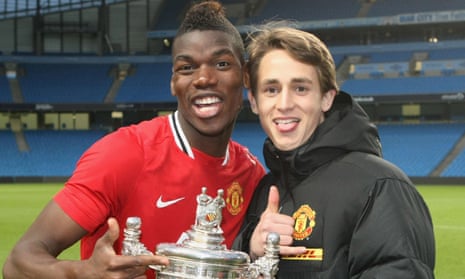The money is so astronomical these days, the rich are getting so much richer and the numbers are getting higher all the time, perhaps this is an appropriate point to ask how long it will be before football ushers in its first £1m-a-week player.
Quicker than you might imagine, judging by a recent interview with one of the sport’s more formidable agents. “I don’t think the bubble is going to burst,” says Jonathan Barnett. “Football’s getting bigger and bigger, and salaries will get bigger and bigger. So, yes, someone getting paid £50m a year? I think that will come very shortly.”
Barnett, for those not familiar with the name, is in a good position to judge, given that he has Gareth Bale, superstar, among his clients and, as such, orchestrated the £85m move from Tottenham Hotspur to Real Madrid that made the Welshman the most expensive player on the planet. Very modest he is about it, too. “To be able to say I’ve done the biggest deal in history is fantastic, and people do look at me in a different light. I talked to a player abroad and the mum and dad wanted to have a photograph taken with me. I’m not saying it was because they liked me, it was because they were thinking: ‘This is the guy who did the world record.’ I get a lot of that. Most of the young players abroad have their family take a picture with me.”
Now, of course, that deal has been eclipsed by Paul Pogba’s transfer from Juventus to Manchester United, raising the world record to £89.3m, and it is no wonder so many people find the sums mind-boggling when the agent in that case, Mino Raiola, has reputedly pocketed something in the region of ¤25m. Raiola’s clients also include Zlatan Ibrahimovic and Henrikh Mkhitaryan and he presumably likes having United’s executive vice‑chairman, Ed Woodward, on speed dial. Raiola, to put it into context, has earned more from his various transactions this summer than Sir Alex Ferguson was paid in any five-year period, pre-2010, when he was ruling Old Trafford at his absolute peak.
At the other end of the scale, just consider the disparity between the various rungs of English football when Barnsley’s sell-on fee from John Stones’s £47.5m transfer between Everton and Manchester City is higher, at £6.8m, than the Yorkshire club’s entire annual income, posted in their last accounts at £4.8m.
Then there is the story that reached me earlier in the summer about the vacancy for a new Port Vale manager. Neil Redfearn was interviewed and Port Vale, mid-table finishers in League One, liked what they saw. The talks broke down when Redfearn heard the salary was £40,000 a year – less than the kit man might earn at many Premier League clubs.
The gap is certainly getting bigger. This is the way football has been moving for some time and we should probably be aware by now that complaining about it won’t change anything. Yet it doesn’t necessarily mean we have to like it that way and it was certainly difficult to read Arsène Wenger’s views on the changing finances without the sense of deflation that comes from finding certain parts of the sport increasingly hard to embrace.
Wenger talked about a culture of players getting rich before their time and when he was asked about the biggest changes, approaching 20 years as Arsenal manager, he mentioned the power of agents. “I’ve fought all my life for footballers to make money but when you pay them before they produce it can kill the hunger,” he said. “I’m scared we now have players under 17, under 18, who make £1m a year. When Ian Wright was earning that, he’d scored goals, he’d put his body on the line. Now, before they start, they are millionaires – a young player who has not even played.” Multimillionaires, to be precise. The going rate apparently for a “top kid” in today’s climate is actually £40,000 a week and a four-year contract – around £8m in total.
Don’t underestimate the sapping effect of this too much, too young culture. Adnan Januzaj was regarded as one of the more gifted young players in Europe when he signed his first big deal at Manchester United in October 2013, aged 18. “A young Cruyff,” the then manager, David Moyes, called him behind the scenes. He meant Johan, presumably, rather than Jordi, bearing in mind Real Madrid, Barcelona and Paris Saint-Germain were all trying to prise Januzaj away from Old Trafford. Now, three years on, he has pitched up on loan at Sunderland. José Mourinho did not immediately want him. Louis van Gaal did not like what he saw. Borussia Dortmund signed him on loan last season then sent him back four months early. Januzaj, now 21, is said to be extremely fond of the star footballer’s perks and it probably isn’t a coincidence his drift began after finalising that five-year contract.
A player with those blurred priorities should not expect too much sympathy over the leaked news he feels “humiliated” by Mourinho and it reminds me of a conversation with someone at Old Trafford towards the end of last season and the revelation from inside the dressing room that some of the senior players did not entirely like what was happening with their younger colleagues.
How, it was asked, could the club justify a £2.5m deal for Tyler Blackett? Blackett signed that contract in February 2015 and in the rest of that season he made two substitute appearances, totalling 27 minutes. Last season he went on loan to Celtic and a couple of days ago I spoke to someone who watched his debut in Scotland. “It defied belief he was a Manchester United player,” came the verdict. Blackett started two more games and never appeared in Celtic’s squad for a league match again. The 22-year-old is now waiting to go out on loan again and here’s the thing: there aren’t too many clubs who want to take on a £20,000-a-week salary.
The difficulty is knowing what can be done to change this culture when there is more money than ever swilling around in the Premier League and clubs want to avoid getting their fingers being burned in the way that happened to United in Pogba’s first spell at Old Trafford, when he was not given the money he wanted and ran down his contract to get a better deal at Juventus.
“There will never, ever be a better time to be a footballer than now,” Alan Shearer declared in 1999. But he was wrong. This season, with the new television deal, there is so much prize money to share around the club finishing bottom of the Premier League will earn more than whoever wins the Bundesliga. All 20 of England’s top-division clubs are expected to feature when the Deloitte Football Money League names the top 30 richest in the world and it means we now have a league where Bournemouth, Crystal Palace, Leicester, Manchester United, Swansea, Watford and West Ham have all broken their transfer records this summer. Everton expect to do the same this week for Yannick Bolasie and it tells you a lot about the sport’s modern finances when an unpretentious club such as Stoke can offer £20m for Saido Berahino and West Brom are willing to pay £25m for Christian Benteke. Bolasie is apparently now worth somewhere between £25m and £30m, and when a player of his level is generating that kind of fee it becomes clear why clubs are paying more than ever to their rising stars.
There is no easy solution but perhaps the authorities should explore whether it is possible to cap player salaries at a certain age. It has been discussed, according to Dan Ashworth, the Football Association’s technical director, and it might also be a good idea to introduce trust funds, meaning young players would receive a portion of their wages with the rest kept back until later in their careers.
Unfortunately, it is not always easy to know what the relevant people are actually doing about it. Colin Gordon, another of the sport’s more prominent agents, was interviewed recently for a book about the malaise affecting England’s national team and told a story about holding a two-hour meeting with Greg Dyke, then the FA chairman, to propose the trust-fund idea. “Greg Dyke loved it,” he recalls. “‘Fantastic, brilliant,’ he said, ‘send me an email.’” Gordon sent Dyke the email. And then what? “I didn’t hear from him.”
Charlton farce no laughing matter
Perhaps the saddest part of the latest PR fiasco involving Charlton Athletic is that it seems entirely fitting for what this once‑proud club have become under their current regime.
It is certainly difficult to think of any other occasion when a supporter applying to buy a season ticket has subsequently received a letter saying it depends on signing a contract preventing him from making “derogatory comments” on social media about the way the club are run.
Unfortunately for Charlton, a certain amount of online criticism is probably to be expected when the club have been relegated to League One, featuring various protests about the owner, Roland Duchâtelet, and the chief executive, Katrien Meire. Perhaps the relevant people should understand that the best way to prevent complaints is to run the club in a way that provokes goodwill. In the meantime, what a shame that the “Agreed Behavioural Contract” does not work both ways, so Charlton’s supporters could monitor the conduct of the people running the club if needs be.
Zlatan self-centred but wins you over
Becoming Zlatan, Fredrik Gertten’s documentary following the early parts of Zlatan Ibrahimovic’s career, is released on Monday and I can recommend it, not least because it is so rare to see, close up, one of our category-A footballers at such a human level. Ibrahimovic does not disappoint with that mix of arrogance and occasional brilliance that leaves the impression Manchester United’s new signing, not too dissimilar from Cristiano Ronaldo, will talk eloquently about any subject, as long as that subject is himself.
It isn’t an act and it quickly becomes clear Ibrahimovic was just as full of himself as a youngster at Malmo as he is now. As one of his older team-mates in Sweden puts it: “He isn’t a star yet, but he thinks he is.”
Equally, there is more to Ibrahimovic than the braggadocio – note the revulsion on his face when Ajax fans whistle one of his early performances in Amsterdam (“They don’t know how good I am”) – and my guess is you might like him more after watching this film.

